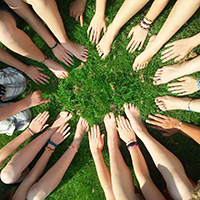
Contributor: Crystal Karges, MS, RDN, IBCLC for Addiction Hope
The Struggle of Addiction

Watching someone you love struggle with an addiction is a painful and overwhelming process. Is there someone in your life that you love who is suffering with an addiction to drugs or alcohol? Perhaps it is a parent or a sibling, someone who you once had a close relationship with.
Seeing someone you care about live with the burden of addiction can be heart breaking, especially as you observe the many consequences unfold, such as the physical, emotional, and psychological effects.
Addictions also change relationships, and this may be something you have found to be true in your own life. Family members that you once had great communication with can suddenly seem distant, withdrawn, or detached if an addiction takes over. Things that you once enjoyed as a family may seem a distant memory in the shadow of addictive behaviors.
Consequences of Addiction
The consequences of addiction may be felt most by children who have parents struggling with alcoholism or drug addiction. As a person becomes more engrossed in their substance of choice, other priorities become neglected. In the case of an addicted parent, children may be pushed to the wayside unintentionally.
Having a family member with an addiction can lead to many consequences for others in the family, particularly as it invokes feelings such as:
- Shame
- Guilt
- Frustration
- Anger
- Confusion.
For these reasons, it is important that family members find support they need while their loved one goes through the process of addiction and recovery. Living with an addict can be strenuous and burdening, and a critical part of self-care is finding a support system outside the home.
Support Groups
Fortunately, many support groups and programs exist with the purpose of aiding family members who have a loved one battling addiction. If you are supporting a family member who is addicted to drugs or alcohol, consider joining one of the following support groups to help fortify you through this trialing time:
Al-Anon:
Based on the twelve steps, the twelve traditions, and the twelve concepts of service, these support groups offer friends and family members of problem drinkers help and support through their individual situations [1].
Through the sharing of experiences among other members in group meetings, families learn they are not alone in the struggles they may be facing with their addicted family member. Al-Anon support groups also offer members sponsorship opportunities and mentorships, which can be particularly helpful for younger individuals.
Nar-Anon:
 Similar to Al-Anon, Nar-Anon is a twelve-step program for friends and family members of drug addicts. This program may be especially helpful for individuals with family members who are addicted to illicit drugs or prescription medications.
Similar to Al-Anon, Nar-Anon is a twelve-step program for friends and family members of drug addicts. This program may be especially helpful for individuals with family members who are addicted to illicit drugs or prescription medications.
Nar-Anon gives members the opportunity to openly share experiences and hear from other members in a structured group setting. Meetings can be found worldwide and give families a sense of community during a time that can feel very isolating [2].
Adult Children of Alcoholics:
Adult children of alcoholics, or ACA, is an anonymous support group for men and women who may have grew up in dysfunctional homes as a result of addiction. ACA is also based on the twelve steps for recovery and helps individuals understand how their childhood has impacted who they are today. Meetings are available in person, via telephone, through internet chat and email.
The ACA is a valuable community for men and women who may feel as though they have not yet resolved or processed the hurts from their childhood. This is also a helpful and supportive community for adult children who continue to live with addicted parents or family members in their home setting. Several events are hosted by the ACA for their community in addiction to their support groups and meetings [3]
Getting Help
Addiction impacts families in a multitude of ways, and it is important that each family member can find the support they need to overcome the challenges and obstacles they may be facing. If an addicted family member has directly impacted you, know that there is hope and support for you.
Consider joining one of the above groups to connect to a community of other people who can help strengthen you during this time.
Community Discussion – Share your thoughts here!
What has been your experience with seeking help from programs and support groups? What benefits have they brought to your recovery?
References:
Last Updated & Reviewed By: Jacquelyn Ekern, MS, LPC on December 13th, 2014
Published on AddictionHope.com
